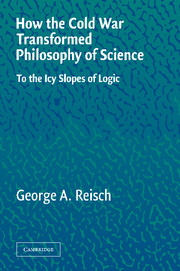Book contents
- Frontmatter
- Contents
- Preface and Acknowledgments
- 1 An Introduction to Logical Empiricism and the Unity of Science Movement in the Cold War
- 2 Otto Neurath, Charles Morris, Rudolf Carnap, and Philipp Frank: Political Philosophers of Science
- 3 Leftist Philosophy of Science in America and the Reception of Logical Empiricism in New York City
- 4 “Doomed in Advance to Defeat”? John Dewey on Reductionism, Values, and the International Encyclopedia of Unified Science
- 5 Red Philosophy of Science: Blumberg, Malisoff, Somerville, and Early Philosophy of Science
- 6 The View from the Left: Logical Empiricism and Radical Philosophers
- 7 The View from the Far Left: Logical Empiricism and Communist Philosophers
- 8 Postwar Disillusionment, Anti-Intellectualism, and the Values Debate
- 9 Horace Kallen's Attack on the Unity of Science
- 10 Creeping Totalitarianism, Creeping Scholasticism: Neurath, Frank, and the Trouble with Semantics
- 11 Frank's Neurathian Crusade: Science, Enlightenment, and Values
- 12 “A Very Fertile Field for Investigation”: Anticollectivism and Anticommunism in Popular and Academic Culture
- 13 Anticommunist Investigations, Loyalty Oaths, and the Wrath of Sidney Hook
- 14 Competing Programs for Postwar Philosophy of Science
- 15 Freedom Celebrated: The Professional Decline of Philipp Frank and the Unity of Science Movement
- 16 The Marginalization of Charles Morris
- 17 Values, Axioms, and the Icy Slopes of Logic
- 18 Professionalism, Power, and What Might Have Been
- References
- Index
10 - Creeping Totalitarianism, Creeping Scholasticism: Neurath, Frank, and the Trouble with Semantics
Published online by Cambridge University Press: 21 January 2010
- Frontmatter
- Contents
- Preface and Acknowledgments
- 1 An Introduction to Logical Empiricism and the Unity of Science Movement in the Cold War
- 2 Otto Neurath, Charles Morris, Rudolf Carnap, and Philipp Frank: Political Philosophers of Science
- 3 Leftist Philosophy of Science in America and the Reception of Logical Empiricism in New York City
- 4 “Doomed in Advance to Defeat”? John Dewey on Reductionism, Values, and the International Encyclopedia of Unified Science
- 5 Red Philosophy of Science: Blumberg, Malisoff, Somerville, and Early Philosophy of Science
- 6 The View from the Left: Logical Empiricism and Radical Philosophers
- 7 The View from the Far Left: Logical Empiricism and Communist Philosophers
- 8 Postwar Disillusionment, Anti-Intellectualism, and the Values Debate
- 9 Horace Kallen's Attack on the Unity of Science
- 10 Creeping Totalitarianism, Creeping Scholasticism: Neurath, Frank, and the Trouble with Semantics
- 11 Frank's Neurathian Crusade: Science, Enlightenment, and Values
- 12 “A Very Fertile Field for Investigation”: Anticollectivism and Anticommunism in Popular and Academic Culture
- 13 Anticommunist Investigations, Loyalty Oaths, and the Wrath of Sidney Hook
- 14 Competing Programs for Postwar Philosophy of Science
- 15 Freedom Celebrated: The Professional Decline of Philipp Frank and the Unity of Science Movement
- 16 The Marginalization of Charles Morris
- 17 Values, Axioms, and the Icy Slopes of Logic
- 18 Professionalism, Power, and What Might Have Been
- References
- Index
Summary
As Neurath fended off Kallen's attacks in the last year of his life, he was also immersed in a long and frustrating debate with Carnap. It began in 1942 with a renewed skirmish over the viability of semantics and Tarski's theory of truth. By 1944, it had become exacerbated by a dispute over Neurath's encyclopedia monograph, Foundations of Social Science (Neurath 1944). As we see below in this chapter, Neurath charged Carnap and semantics with metaphysical mischief that had potentially severe political consequences. In some ways, Neurath's complaints against semantics paralleled Kallen's complaints about the Unity of Science movement, and they tended to the same overall historical effect: They helped to widen and sustain a rift within the movement that would later help facilitate logical empiricism's subsequent break with the Unity of Science movement. The debate arrayed Neurath, Frank, and Morris, on the one side, against most other logical empiricists whom Neurath and Frank believed were veering into formal, logical modes of philosophical inquiry that, were they to become dominant, would reduce the practical utility and relevance of philosophy of science.
Carnap and Neurath
Histories of the Vienna Circle usually adopt the view that the circle was intellectually and politically divided into a more radical left, led by Neurath, Carnap, and Hahn (who together wrote the circle's manifesto), and a more conservative right, led by Schlick and Friedrich Waismann.
- Type
- Chapter
- Information
- How the Cold War Transformed Philosophy of ScienceTo the Icy Slopes of Logic, pp. 191 - 207Publisher: Cambridge University PressPrint publication year: 2005



